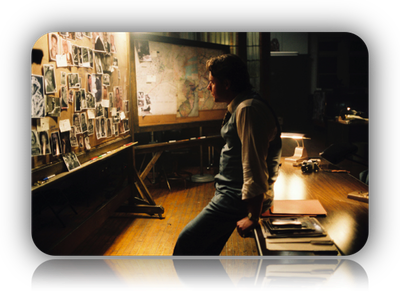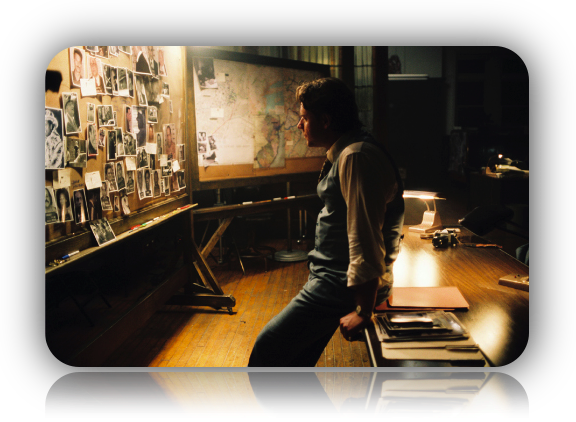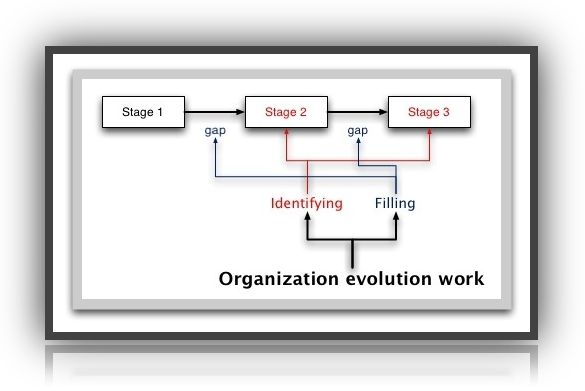Economic development work approach
Moving brains toward tomorrowS
This is a public service website for helping people
navigate a profoundly changing world
It provides a big-picture thinking landscape for
working through time

The site primarily uses Peter Drucker’s top of the food-chain work.
It’s a “prototype.”
We can only work on, with and toward the “things”
on our active “mental radar.”
Imagine the outcome for someone in 1930, 1950, 1970, 1990 or 2005
confidently and steadfastly acting on the assumption that
tomorrows were going to be like yesterdays — an extension of the past.
What would be the appropriate assumptions today?
“AS WE ADVANCE deeper into the knowledge economy …” — Drucker books

A starting foundation
A world moving toward unimagined futureS
«§§§»
The site’s origins come from
several years of corporate restructuring work — everybody
was very busy working on things without a future — and
subsequent work on the changing world and its implications.
Technology Is Wiping Out Companies Faster than Ever
“High tech is living in the nineteenth century,
the pre-management world.
They believe that people pay for technology.
They have a romance with technology.
But people don’t pay for technology:
they pay for what
they get out of technology.”
— The Frontiers of Management

How many Americans are purposefully working on the
challenges of navigating toward different tomorrows
in a changing and unpredictable world — based on
the assumption that tomorrows are not
going to be an extension of today
(which is largely yesterday)?
How can anyone effectively work amidst the confusion
and misinformation that seems to predominate discussions
and thinking on entrepreneurship, innovation, marketing,
productivity, management, and leadership?
It’s in the news
“To know something,
to really understand something important,
one must look at it from sixteen different angles.
People are perceptually slow,
and there is no shortcut to understanding;
it takes a great deal of time.” PFD read more

Connecting the dots

“We live in a period of PROFOUND TRANSITION
and the changes
are more radical perhaps
than even those that ushered in
the “Second Industrial Revolution”
of the middle of the 19th century,
or the structural changes triggered by
the Great Depression
and the Second World War. …
…
For in many cases … the new realities and their demands
require a REVERSAL of policies
that have worked well for the last century
and, even more, a change in the MINDSET of
organizations as well as of individuals.” — Peter Drucker
Examples: News ::: 1, 2, 3, 4, 5, 6 …
Economic stagnation and severe social tension from
failure to raise knowledge and service worker productivity
… “But if existing institutions cannot learn to innovate,
the social consequences will be
almost unbearably severe”. — Managing for the Future
Those who don’t get extensive thinking and decision exposure
to the work necessary to navigate a changing world
will most likely become a prisoner of the past.
If they don’t get the right exposure at work, where will they get it?
And what are the social and economic consequences of
directing work based yesterday’s assumptions?

Management and Economic Development
“Management creates economic and social development.
Economic and social development is the result of management.
It can be said, without too much oversimplification, that there are no “underdeveloped countries.”
There are only “undermanaged” ones.
This means that management is the prime mover and that development is a consequence.
All our experience in economic development proves this.
Wherever we have only capital, we have not achieved development.
In the few cases where we have been able to generate management energies, we have generated rapid development.
Development, in other words, is a matter of human energies rather than of economic wealth.
And the generation and direction of human energies is the task of management.”
Feb 20 — The Daily Drucker
Rarely in human history has any institution emerged as quickly as management or had as great an impact so fast.
In less than 150 years, management has transformed the social and economic fabric of the world’s developed countries.
It has created a global economy and set new rules for countries that would participate in that economy as equals.
And it has itself been transformed.
“AS WE ADVANCE deeper into the knowledge economy, the basic assumptions underlying much of what is taught and practiced in the name of management are hopelessly out of date.” — Management’s New Paradigm
Few executives are aware of the tremendous impact management has had.
Indeed, a good many are like M. Jourdain, the character in Le Bourgeois Gentilhomme, the Molière play, who did not know that he spoke prose.
They barely realize that they practice—or mispractice—management.
As a result, they are ill-prepared for the tremendous challenges that now confront them.
The truly important problems managers face do not come from technology or politics.
They do not originate outside management and enterprise.
They are problems caused by the very success of management itself.
To be sure, the fundamental task of management remains the same:
to make people capable of joint performance through common goals, common values, the right structure, and the training and development they need to perform and to respond to change.
But the very meaning of this task has changed, if only because the performance of management has converted the workforce from one composed largely of unskilled laborers to one of highly educated knowledge workers.

Apple ™ — from two guys in a garage to iPhone X

The managed institution — society’s way of getting things done.
Knowledge — THE resource
From Knowledge to KnowledgeS
the central energy of a modern society —
it (knowledge) exists only in application
“That knowledge has become the resource,
rather than a resource,
is what makes our society “post-capitalist.”
This fact changes—fundamentally—the structure of society.
It creates new social and economic dynamics.
It creates new politics.
“The post-capitalist society is both
a knowledge society and a society of organizations,
each dependent on the other
and yet each very different in its concepts, views, and values.”
“In the knowledge society,
it is not the individual who performs.
The individual is a cost center
rather than a performance center.
It is the organization that performs.”
“It is the very nature of knowledge
that it changes fast and
that today’s certainties
will be tomorrow’s absurdities” — Peter Drucker
“The productivity of knowledge is going to be
the determining factor in the competitive position
of a company, an industry, an entire country” — PFD
more
The terms knowledge industries, knowledge work and knowledge worker
are nearly fifty years old.
They were coined around 1960, simultaneously but independently—
the first by a Princeton economist, Fritz Machlup,
the second and third by this writer.
Now everyone uses them, but as yet hardly anyone
understands their implications for human values and human behavior,
for managing people and making them productive,
for economics, and for politics.
What is already clear, however, is that the emerging knowledge society
and knowledge economy will be radically different
from the society and economy of the late twentieth century.
Chapter 4, Management, Revised Edition
… “For the major new insights in every one
of the specialized knowledges arise out of another,
separate specialty, out of another one of the knowledges.
Both economics and meteorology are being transformed
at present by the new mathematics of chaos theory.
Geology is being profoundly changed by the physics of matter;
archaeology, by the genetics of DNA typing;
history, by psychological, statistical, and technological analyses
and techniques.” Chapter 48, Management, Revised Edition
Peter observed that we are now in another critical moment:
the transition from the industrial to the knowledge-based economy …
We should expect radical changes in society
as well as in business.
“We haven’t seen all those changes yet,” he added.
Even the very products we buy will change drastically. …
He spent the better part of the next two hours defining and pulling this idea apart
(the application of knowledge to knowledge): the importance of
accessing, interpreting, connecting, and translating knowledge” more …
The End of Economic Man
Up to Poverty ::: The Vanishing East ::: The rise of new power centers :::
Urban world: The shifting global business landscape
A Century of Social Transformation ::: The priority tasks
Technology, Management and Society
Profits & Profitability
Management and the World’s Work
The New Society of Organizations
From Analysis to Perception — The New Worldview
Knowledge and Technology
Knowledge: Its Economics and Productivity
Management’s New Paradigms
The Next Society
All of this embedded within …
Glossary (wip)
Information — the organizing principle for work
A world organized by information
Search for “knowledge” here

Knowledge, especially advanced knowledge, is always specialized.
By itself it produces nothing.
Yet a modern business, and not only the largest ones, may employ up to 10,000 highly knowledgeable people who represent up to sixty different knowledge areas.
Engineers of all sorts, designers, marketing experts, economists, statisticians, psychologists, planners, accountants, human resources people—all working together in a joint venture.
None would be effective without the managed enterprise.
After World War II we began to see that management is not business management.
It pertains to every human effort that brings together in one organization people of diverse knowledge and skills.
It needs to be applied to all social sector institutions, such as hospitals, universities, churches, arts organizations, and social-service agencies, which since World War II have grown faster in the United States than either business or government.
For even though the need to manage volunteers or raise funds may differentiate nonprofit managers from their for-profit peers, many more of their responsibilities are the same—among them defining the right strategy and goals, developing people, measuring performance, and marketing the organization’s services.
Management, world-wide, has become the new social function.
There is no point in asking which came first: the educational explosion of the last hundred years or the management that put this knowledge to productive use.
Modern management and modern enterprise could not exist without the knowledge base that developed societies have built.
But equally it is management, and management alone, that makes effective all this knowledge and these knowledgeable people.
The emergence of management has converted knowledge from social ornament and luxury into the true capital of any economy.

… This means a radical change in structure for the organizations of tomorrow.
It means that the big business, the government agency, the large hospital, the large university will not necessarily be the one that employs a great many people.
It will be the one that has substantial revenues and substantial results—achieved in large part because it itself does only work that is focused on its mission; work that is directly related to its results; work that it recognizes, values, and rewards appropriately.
The rest it contracts out. — Post-Capitalist Society

Thoughts about the future
The future depends on what’s between each individual’s ears.
Foundations For Future Directed Decisions
Extrapolating yesterdayS is a fruitless attempt to predict the future.
“Trying to predict the future
is like driving down a country road at night
with no headlights on and
looking out the back window”
“We know only two things about the future.
It cannot be known.
It will be different from what exists now
and from what we now expect”
Peter Drucker
The actual results of action are not predictable.
Indeed, if there is one rule for action,
and especially for institutional action,
it is that the expected results will not be attained.
The unexpected is practically certain.
But are the unexpected results deleterious? Read more
The future that has already happened
|


